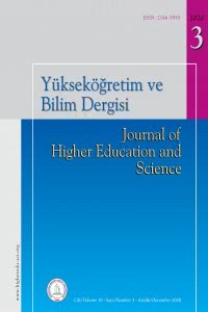Hemşirelik Öğrencilerinin Pandemi Sürecinde Uzaktan Tamamlanan Mesleki Bir Dersin Uygulama Telafisine İlişkin Görüşleri
Beceri eğitimi, Hemşirelik öğrencisi, Hemşirelik eğitimi, Pandemi, Telafi eğitimi
Nursing Students’ Views Towards the Compensatory Training of a Vocational Course Completed Remotely During the Pandemic Process
___
- Ağır, F., Gür, H., & Okçu, A. (2008). Uzaktan eğitime karşı tutum ölçeği geliştirmesine yönelik geçerlik ve güvenirlik çalışması. E-Journal of New World Sciences Academy, 3(2), 128-39.
- Barton, A. J., Murray, T. A., Spurlock, D. R. (2020). An open letter to members of the nursing education community. Journal of Nursing Education, 59(4), 183-183.
- Church, C. D. (2016). Defining competence in nursing and its relevance to quality care. Journal of Nurses in Professional Development, 32(5), 9-14.
- Diab, G. M. A. E. H., & Elgahsh, N. F. (2020). E-learning during COVID-19 pandemic: Obstacles faced nursing students and its effect on their attitudes while applying it. American Journal of Nursing, 9(4), 300-314.
- Hemşirelik Eğitimi Derneği. (2021). Hemşirelik öğrencilerinin uzaktan eğitime yönelik görüşleri. Erişim adresi http://www.hemed.org.tr/hemsirelik-ogrencilerinin-uzaktan-egitime-yonelik-gorusleri
- Kalanlar, B. (2022). Nursing education in the pandemic: A cross-sectional international study. Nurse Education Today, 108, 105213.
- Karaman, F., Çakmak, S., & Yerebakan, A. N. (2021). Covid-19 pandemisinde hemşirelik öğrencilerinin eğitimi: uzaktan eğitim süreci ve etkileri. İstanbul Gelişim Üniversitesi Sağlık Bilimleri Dergisi, 15, 571-580.
- Konrad, S., Fitzgerald, A., Deckers, C. (2020). Nursing fundamentals–supporting clinical competency online during the COVID-19 pandemic. Teaching and Learning in Nursing, 16(1), 53-56.
- Kürtüncü, M., & Kurt, A. (2020). COVID-19 pandemisi döneminde hemşirelik öğrencilerinin uzaktan eğitim konusunda yaşadiklari sorunlar. Avrasya Sosyal ve Ekonomi Araştırmaları Dergisi, 7(5), 66-77.
- Lazenby, M., Chambers, S., Chyun, D., Davidson, P., Dithole, K., Norman, I., & Tlou, S. (2020). Clinical nursing and midwifery education in the pandemic age. International Nursing Review, 67(3), 323-325.
- Liu, Y., & Aungsuroch, Y. (2018). Current literature review of registered nurses’ competency in the global community. Journal of Nursing Scholarship, 50(2), 191-199.
- McInnes, S., Halcomb, E., Huckel, K., & Ashley, C. (2019). Experiences of registered nurses in a general practice-based new graduate program: A qualitative study. Australian Journal of Rimary Health, 25(4), 366-373.
- Mete, S., & Uysal, N. (2010). Hemşirelik mesleksel beceri laboratuarındaki psikomotor beceri eğitiminin öğrenci ve eğiticiler tarafından değerlendirilmesi. Turkish Journal of Research & Development in Nursing, 12(2), 28-38.
- Michel, A., Ryan, N., Mattheus, D., Knopf, A., Abuelezam, N. N., Stamp, K., ... & Fontenot, H. B. (2021). Undergraduate nursing students’ perceptions on nursing education during the 2020 COVID-19 pandemic: A national sample. Nursing Outlook, 69(5), 903-912.
- Muraraneza, C., & Mtshali, G. N. (2018). Conceptualization of competency based curricula in pre-service nursing and midwifery education: A grounded theory approach. Nurse Education in Practice, 28, 175-181.
- Njie-Carr, V. P., Ludeman, E., Lee, M. C., Dordunoo, D., Trocky, N. M., & Jenkins, L. S. (2017). An integrative review of flipped classroom teaching models in nursing education. Journal of Professional Nursing, 33(2), 133-144.
- Oducado, R. M., & Estoque, H. (2021). Online learning in nursing education during the COVID-19 pandemic: Stress, satisfaction, and academic performance. Journal of Nursing Practice, 4(2), 143-153.
- Oducado, R. M. F., & Soriano, G. P. (2021). Shifting the education paradigm amid the COVID 19 pandemic: Nursing students’ attitude to E learning. Africa Journal of Nursing and Midwifery, 23(1), 1-14.
- Sheikhaboumasoudi, R., Bagheri, M., Hosseini, S. A., Ashouri, E., & Elahi, N. (2018). Improving nursing students' learning outcomes in fundamentals of nursing course through combination of traditional and e-learning methods. Iranian Journal of Nursing and Midwifery Research, 23(3), 217-221.
- Taşkıran, N., Sarı, D., & Akbıyık, A. (2017). Hemşirelik ögrencilerinin ilaç dozu hesaplama becerileri konusundaki görüşleri ve ilaç uygulama hataları. Ege Üniversitesi Hemşirelik Fakültesi Dergisi, 33(1), 59-72.
- Vatan, F., Avdal, E. Ü., Yağcan, H., Şanlı, D. (2020). COVID-19 pandemisi ve hemşirelik eğitimi derneği faaliyetleri. Koç Üniversitesi Hemşirelikte Eğitim ve Araştırma Dergisi, 17(4), 369-373.
- Wallace, S., Schuler, M. S., Kaulback, M., Hunt, K., & Baker, M. (2021). Nursing student experiences of remote learning during the COVID‐19 pandemic. Nursing Forum, 56(3), 612-618.
- Wittenberg, E., Goldsmith, J. V., Chen, C., Prince-Paul, M., & Capper, B. (2021). COVID 19-transformed nursing education and communication competency: Testing COMFORT educational resources. Nurse Education Today, 107, 105105.
- Yancey, N. R. (2020). Disrupting rhythms: nurse education and a pandemic. Nursing Science Quarterly, 33(4), 299-302.
- Yıldırım, S., Yıldırım, G., Çelik, E., & Karaman, S. (2014). Uzaktan eğitim öğrencilerinin uzaktan eğitime yönelik görüşleri: Bir ölçek geliştirme çalışması. Eğitim ve Öğretim Araştırmaları Dergisi, 3(3), 365-370.
- ISSN: 2146-5959
- Yayın Aralığı: 3
- Başlangıç: 2011
- Yayıncı: Bülent Ecevit Üniversitesi (Önceden Zonguldak Karaelmas Üniversitesi)
Ezgi Pelin YILDIZ, Metin ÇENGEL, Ayşe ALKAN
Nurhat ÖZKALAYCI, İrem YOLCU, Melis TÖZ, Orhan ÇİÇEK
KKTC’de Covid-19 Salgını Bağlamında Akademisyenlerin Uzaktan Eğitime İlişkin Metaforik Algıları
Ayça KAYA, Cemaliye MAHMUTOĞLU
Psikolojik Sağlamlığı Değerlendirme Ölçeği: Türkçe Versiyonuna İlişkin İlk Psikometrik Bulgular
Tuğba TÜRKKAN, Kenan BÜLBÜL, Hatice ODACI
Funda ERYILMAZ BALLI, Fatih HERDEM
Ebelik Alanında Yapılan Lisansüstü Tezlerin İçerik Analizi
Yasemin ERKAL AKSOY, Ayşe Nur ATAŞ, Sema YILMAZ
Üniversite Öğrencilerinin Üniversite ve Kent Memnuniyetinin Değerlendirilmesi: Türkiye’den Bir Örnek
Hemşirelik Öğrencilerine Verilen İnovasyon Eğitiminin Yenilikçilik Düzeylerine Etkisi
